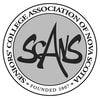October - November, 2024
The schedule of courses to be held in the fall term will be announced here in September 2024.
COURSES |
ORGANIZATION |
© COPYRIGHT 2016. ALL RIGHTS RESERVED.
© SCANS all rights reserved. The form and contents of this web site may not be duplicated, altered, or reproduced without the written permission of the Seniors' College Association of Nova Scotia (SCANS). Effort is made to provide information which is relevant and as complete, up-to-date and accurate as possible. However SCANS cannot be held responsible to users of the information or any other person for any errors or omissions, or for any losses, costs or claims which arise as a result of relying on such information or advice. Information provided in any Seniors’ College Association of Nova Scotia lecture is for general informational and educational purposes only and does not constitute professional advice of any kind. The opinion of the presenter is not necessarily endorsed by SCANS.
LAND ACKNOWLEDGEMENT
We would like to acknowledge that we are in Mi’kma’ki, the ancestral and unceded territory of the Mi’kmaq People. This territory is covered by the Treaties of Peace and Friendship. This series of treaties did not surrender Indigenous land, resources or sovereignty but instead established rules for an ongoing relationship between nations. We recognize the significance of these treaties and the need for continual learning and engagement in the work of the truth, reconciliation and equity. We are all treaty people. We also recognize that African Nova Scotians are a distinct people whose histories, legacies and contributions have enriched that part of Mi’kma’ki known as Nova Scotia for over 400 years.
LAND ACKNOWLEDGEMENT
We would like to acknowledge that we are in Mi’kma’ki, the ancestral and unceded territory of the Mi’kmaq People. This territory is covered by the Treaties of Peace and Friendship. This series of treaties did not surrender Indigenous land, resources or sovereignty but instead established rules for an ongoing relationship between nations. We recognize the significance of these treaties and the need for continual learning and engagement in the work of the truth, reconciliation and equity. We are all treaty people. We also recognize that African Nova Scotians are a distinct people whose histories, legacies and contributions have enriched that part of Mi’kma’ki known as Nova Scotia for over 400 years.

